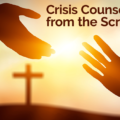Crisis Counsels from the Scriptures #81
This week we have been reflecting about the following verses from Amos:
This is what the Lord God Almighty says: Take away from me the noise of your songs; I will not listen to the melody of your harps. But let justice roll down like waters, and righteousness like an ever-flowing stream.
Amos 5:16,23–24
Since the Biblical prophets were calling people to a right relationship with God, it is astonishing that a prophet would declare that God was not listening to their worship! But what happens if people engage in all the sounds and activities of worship while ignoring the need for just action in their society? This is what was happening in Amos’ day, and it is happening also at times today! There are cases where people have been joining very publicly in worship while eschewing responsible behavior in a pandemic, or while ignoring the need for racial justice or concern for people who are “on the margins” in our society. Amos leveled his critique against any worship that was not coupled with genuinely righteous action. Paul would offer the same critique centuries later, when he lamented that people would “hold to the form of religion while denying its power.” (II Timothy 3:5)
In the Biblical view, worship is of central importance, for it is the fundamental response of people to God’s grace – the joining of faithful people into a joyous connection with God. But if it is a real connection with God, it will result in what Amos was calling for: “justice rolling down like waters, and righteousness like an ever-flowing stream.”
Prayer – Draw us, O Lord, into that genuine worship which produces righteous living. Share on XJoin in Sunday worship, at the 8:30 (in-person) or the 9:30 or 10:30 (livestreamed) worship hours at live.kentmethodist.org.

